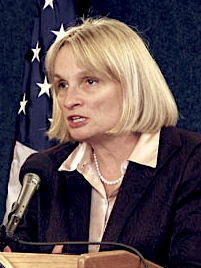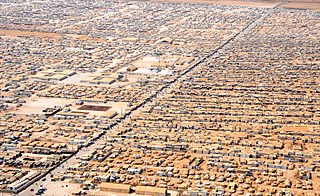Kilian Kleinschmidt | |
|---|---|
 | |
| Born | |
| Occupation(s) | Director, Switxboard |
Kilian Kleinschmidt (born 1962 in Essen, West Germany) is a German entrepreneur and former UNHCR official who served as the director of the Zaatari refugee camp. [1]
Kilian Kleinschmidt | |
|---|---|
 | |
| Born | |
| Occupation(s) | Director, Switxboard |
Kilian Kleinschmidt (born 1962 in Essen, West Germany) is a German entrepreneur and former UNHCR official who served as the director of the Zaatari refugee camp. [1]
Kleinschmidt was born in Essen, West Germany as the son of teachers, and grew up in Berlin. After taking his A-Levels, he worked as a roofer. He then joined a cooperative that raised 35 goats in the Pyrenees to make cheese. At 26, during a motorcycle trip in Mali, he met an aid worker and helped out to build a school in Youvarou. He subsequently went on to be associated with UN aid agencies in different capacities. He has five biological children from three relationships and currently resides in Tunis, Tunisia . [2] [3]

He worked in Sudan during the Second Sudanese Civil War and helped organise a camp for the Lost Boys of Sudan. He was in Mogadishu in 1993 during the Battle of Mogadishu. He spent two years in Sri Lanka as a liaison to the Liberation Tigers of Tamil Eelam rebels. He also coordinated the rescue of Rwandan Hutu refugees caught in the rain forests of Congo in 1997 for UNHCR. He repaired an old railroad built by the Belgians, and used a train powered by a steam locomotive to rescue many of the refugees. He has also worked as the Deputy UNHCR representative in Kenya and deputy to the Special Envoy of the UN Secretary General for assistance to Pakistan. [2] [4] [5]
He took over as the 'Senior Field Coordinator' for UNHCR at the Zaatari refugee camp on March 12, 2013 following a series of temporary camp directors. He was tasked with restoring order in the second largest refugee camp in the world. After a 25-year stint with the UN, he founded his own aid consultancy called Switxboard. He also serves as a consultant on refugee matters to the Austrian Ministry of the Interior. [2] [6] [7]
The Office of the United Nations High Commissioner for Refugees (UNHCR) is a United Nations agency mandated to aid and protect refugees, forcibly displaced communities, and stateless people, and to assist in their voluntary repatriation, local integration or resettlement to a third country. It is headquartered in Geneva, Switzerland, with over 18,879 staff working in 138 countries as of 2020.

The International Organization for Migration (IOM) is a United Nations related organization working in the field of migration. The organization implements operational assistance programmes for migrants, including internally displaced persons, refugees, and migrant workers.
Humanitarian aid workers belonging to United Nations organisations, PVOs / NGOs or the Red Cross / Red Crescent are among the list of protected persons under international humanitarian law that grant them immunity from attack by belligerent parties. However, attacks on humanitarian workers have occasionally occurred, and become more frequent since the 1990s and 2000s. In 2017, the Aid Worker Security Database (AWSD) documented 139 humanitarian workers killed in intentional attacks out of the estimated global population of 569,700 workers. In every year since 2013, more than 100 humanitarian workers were killed. This is attributed to a number of factors, including the increasing number of humanitarian workers deployed, the increasingly unstable environments in which they work, and the erosion of the perception of neutrality and independence. In 2012 road travel was seen to be the most dangerous context, with kidnappings of aid workers quadrupling in the last decade, reaching more aid workers victims than any other form of attack.

A refugee camp is a temporary settlement built to receive refugees and people in refugee-like situations. Refugee camps usually accommodate displaced people who have fled their home country, but camps are also made for internally displaced people. Usually, refugees seek asylum after they have escaped war in their home countries, but some camps also house environmental and economic migrants. Camps with over a hundred thousand people are common, but as of 2012, the average-sized camp housed around 11,400. They are usually built and run by a government, the United Nations, international organizations, or non-governmental organization. Unofficial refugee camps, such as Idomeni in Greece or the Calais jungle in France, are where refugees are largely left without the support of governments or international organizations.

Dadaab is a semi-arid town in Garissa County, Kenya. It is the site of a UNHCR base hosting 302,805 registered refugees and asylum seekers as of 31 October 2023, in four camps, making it one of the largest in the world behind Kutupalong refugee camp. The centre is run by the United Nations High Commissioner for Refugees, and its operations are financed by foreign donors. In 2013, UNHCR, the governments of Kenya and Somalia signed a tripartite agreement facilitating the repatriation of Somali refugees at the complex.

Jordan–Syria relations are bilateral relations between the sovereign states of Jordan and Syria. Relations between neighbours have ancient roots as both countries are historically parts of the Levant or the region of Syria. The two states were created after the First World War from former Ottoman dominions by way of a secret bilateral agreement between Britain and France.

Wendy Jean Chamberlin is a veteran diplomat who has served in the United States Department of State and USAID, worked for the UN High Commissioner on Refugees (UNHCR), and served as President of the Middle East Institute until 2018.
Various international and local diplomatic and humanitarian efforts in the Somali Civil War have been in effect since the conflict first began in the early 1990s. The latter include diplomatic initiatives put together by the African Union, the Arab League and the European Union, as well as humanitarian efforts led by the Office for the Coordination of Humanitarian Affairs (OCHA), UNICEF, the World Food Programme (WFP), the Puntland Maritime Police Force (PMPF) and the Somali Red Crescent Society (SRCS).

Syrian diaspora refers to Syrian people and their descendants who chose or were forced to emigrate from Syria and now reside in other countries as immigrants, or as refugees of the Syrian Civil War.
Refugees of the Syrian civil war are citizens and permanent residents of Syria who have fled the country throughout the Syrian civil war. The pre-war population of the Syrian Arab Republic was estimated at 22 million (2017), including permanent residents. Of that number, the United Nations (UN) identified 13.5 million (2016) as displaced persons, requiring humanitarian assistance. Of these, since the start of the Syrian civil war in 2011 more than six million (2016) were internally displaced, and around five million (2016) had crossed into other countries, seeking asylum or placed in Syrian refugee camps worldwide. It is often described as one of the largest refugee crises in history.
Qatar Charity is a humanitarian and development non-governmental organization in the Middle East. It was founded in 1992 in response to the thousands of children who were made orphans by the Afghanistan war and while orphans still remain a priority cause in the organization's work with more than 150,000 sponsored orphans, it has now expanded its fields of action to include six humanitarian fields and seven development fields.

The Zaatari refugee camp is a refugee camp in Jordan, located 10 kilometres (6.2 mi) east of Mafraq, which has gradually evolved into a permanent settlement; it is the world's largest camp for Syrian refugees. It was first opened on 28 July 2012 to host Syrians fleeing the violence in the ongoing Syrian War that erupted in March 2011. It is connected to the road network by a short road which leads to Highway 10.

Syrian refugee camp and shelters are temporary settlements built to receive internally displaced people and refugees of the Syrian Civil War. Of the estimated 7 million persons displaced within Syria, only a small minority live in camps or collective shelters. Similarly, of the 8 million refugees, only about 10 percent live in refugee camps, with the vast majority living in both urban and rural areas of neighboring countries. Beside Syrians, they include Iraqis, Palestinians, Kurds, Yazidis, individuals from Somalia, and a minority of those who fled the Yemeni and Sudanese civil wars.

Humanitarian aid during the Syrian civil war has been provided by various international bodies, organizations and states. The main effort is coordinated by Jonh Ging of the United Nations Office for the Coordination of Humanitarian Affairs (UNOCHA). In 2014, U.N. Security Council Resolution 2165 authorised humanitarian aid to be supplied via four border crossings not controlled by the Syrian government, generally to supply rebel-controlled territory.
Refugees in Jordan rose with the uprising against the Syrian government and its President Bashar al-Assad. Close to 13,000 Syrians per day began pouring into Jordan to reside in its refugee camps.

Salam Neighbor is a 2015 documentary film by the production companies Living on One Dollar and 1001 MEDIA. The title means "hello" neighbor. The title has a dual meaning as the Arabic word "salam" also means "peace."
South Sudanese refugees are persons originating from the African country of South Sudan, but seeking refuge outside the borders of their native country. The world's youngest independent country has a recent and troubled history of prolonged conflicts and ecosystem mismanagement such as overlogging, which has led to desertification. These forces have resulted not only in violence and famine, but also the forced migration of large numbers of the population, both inside and outside the country's borders. South Sudan was cited as the largest refugee crisis in 2016, being the world's third largest, followed by Syria and Afghanistan. As of 2022, the UNHCR estimated that there were 2.4 million refugees under its mandate originating from South Sudan, making the country the fifth largest source of refugees.

Germany–South Sudan relations have existed since the independence of South Sudan in 2011. In the context of the civil war in South Sudan, the Federal Republic of Germany became an important donor of humanitarian aid to South Sudan.